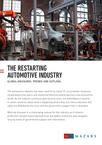
Government intervention to restart the automotive industry: a global perspective
Global policies to restart the auto industry
To gain a better understanding of the global outlook, we collected information from Mazars’ experts in Brazil, China, France, Germany, India, the UK and the US to learn about local government measures ranging from the relaxation of taxes to green vehicle subsidies.
Encouraging green purchases
After weeks of anticipation, the French government announced an €8bn rescue plan for the country’s car industry in late May, including €1bn to cover grants of up to €7,000 to encourage the purchase of green vehicles. "We need a motivational goal - make France Europe's top producer of clean vehicles by bringing output to more than one million electric and hybrid cars per year over the next five years," said President Macron. The government will also give a €3,000 bonus to people who update to a less polluting car, part of scheme that is open to 75% of French households.
This ‘green focus’ reflects moves in China, where the green energy vehicle purchase subsidy policy has been extended to the end of 2022, and the preferential policy of new energy vehicle exemption from vehicle purchase tax has been extended to the end of 2022.
Cost exemptions to ease pressure
China, as outlined in a recent Mazars article, offers us a glimpse of where the rest of the world’s automotive industry could go next. After months of double digit decline, auto production and sales in April were recorded as 2.1 and 2 million units, respectively, up 46.6% and 43.5% month-on-month and up 2.3% and 4.4% year-on-year, according to the China Association of Automobile Manufacturers.1
Government-backed cost exemptions have come hand-in-hand with rising levels of customer demand. These exemptions, while not specifically targeted at the automotive sector in China, are helping bring down overheads. Measures include: any imported materials donated for the epidemic prevention and control shall be exempted from import duties, VAT and excise tax; cash and goods donated by enterprises and individuals for the epidemic prevention and control can be deducted in full amount before CIT/ IIT; and the maximum carryover period for the losses incurred will be extended from five to eight years in 2020.
The Brazilian government has also reacted effectively, introducing payment suspensions to help affected businesses. These include an approximately €3.4 billion transfer of funds from the PIS-PASEP Fund to the Workers Fund (FGTS) and the temporary suspension of instalments of payments of direct financing to companies, and the expansion of credit for micro, small and medium-sized companies to the amount €853 million – made available through partner banks.
Government and bank partnerships
Government partnerships with banks are similarly gaining ground in the UK, with the rollout of the coronavirus businesses interruption loan and the coronavirus corporate finance scheme. The UK government has also deferred VAT payment until end of June 2020; businesses will then have until the end of the 2020-21 tax year to settle liabilities that have accumulated during the deferral period. The deferral applies automatically, and businesses do not need to apply for it.
In Germany, the KfW - a state-backed development bank - has improved existing loan programmes, and now provides loans with reduced interest rates that do not need to be repaid for two years. The German government is also establishing an ‘economic stabilisation fund’ that is targeted towards large companies. The fund supplements the loan assistance and includes €400 billion for guarantees, €100 billion for equity measures, and up to €100 billion to refinance existing KfW programmes.
As for action in the US, it’s important to note that, unlike the 2008/2009 recession, there is unlikely to be an automaker bailout. According to IHS Markit, 4,300 vehicles were produced in North America in April – the lowest recorded since 1945.2 Instead, the government has introduced the payroll protection act to help smaller companies and has deferred payroll taxes for larger ones. While it’s a step in the right direction, it’s unlikely to be enough to combat the losses that are being incurred. The industry there is hopeful for additional incentives that will jumpstart customer demand.
No direct support in Germany
The German government has not implemented any tax support measures dedicated to the auto industry, but it has reduced VAT from 19% to 16% for the rest of the year. Purchase grants - a direct reduction in the price of a new car paid for by the state – were previously floated as a possible incentive, but they have been rejected.
Instead, in early June, the government announced it would promote green vehicle ownership over purchase grants: for vehicles priced up to €40,000, buyers will now receive a bonus of €6,000, compared to the previously available €3,000. The future is clearly green and initial discussions are underway about increasing and decreasing vehicle tax depending on the car’s environmental credentials, starting in 2021.The existing ten-year exemption fully electric cars enjoy from vehicle tax has also been extended until 2030.
Industry calls for assistance
In India, the automotive industry is currently engaged in dialogue with the government on policy on a temporary reduction in standard goods and service tax rate by 10% across all vehicle categories and auto components, introducing an incentive-based vehicle scrappage scheme to generate demand and a reduction in basic custom duty by 5% for three months for auto components.
As the auto industry continues to find ways to restart around the world, government intervention will play a driving role in how manufacturers and brands recover. Timely measures that protect workers and boost commercial activities will be increasingly called for – if they are not already in place. At the same time, the industry and policymakers could find the opportunity to work together and build a green emphasis into how the sector gets back to business.
This article is part of a series focusing on the restarting automotive industry around the world. To read about lessons from China, go here, and to see more responses from our experts around the world, go here.
1http://www.caam.org.cn/chn/21/cate_156/con_5230153.html
2https://ihsmarkit.com/research-analysis/ihs-markit-trims-2020-global-light-vehicle-forecasts.html


